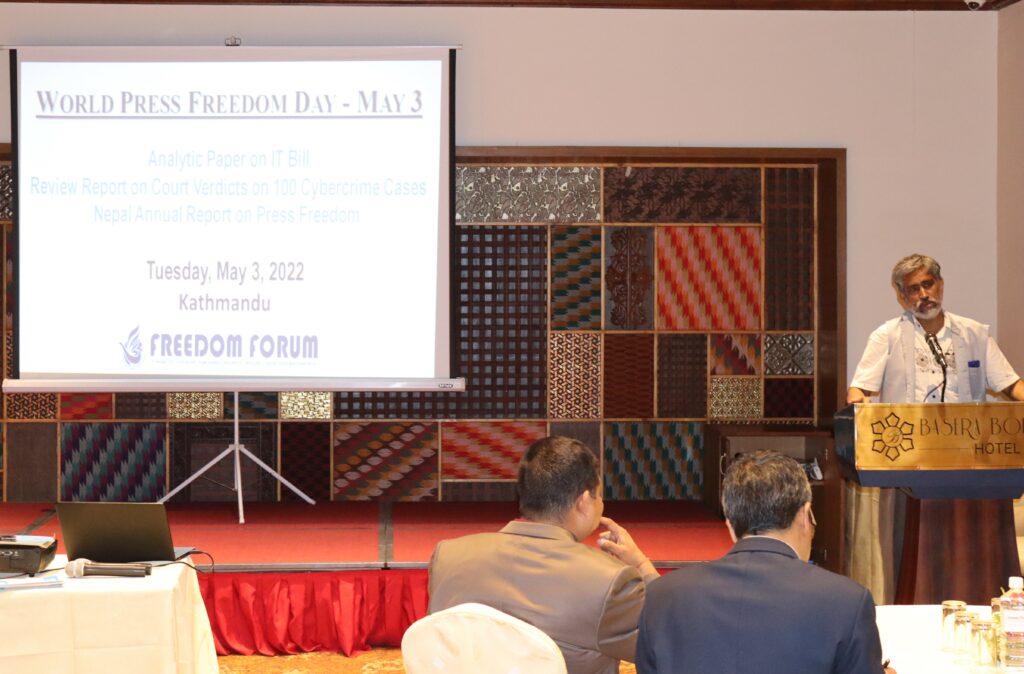
Freedom Forum organized a program marking the World Press Freedom Day, May 3, 2022, where it made three presentations- a policy analyses prepared on the basis of IT Bill, a study report on court verdicts on 100 cybercrime cases, and annual press freedom report-2022.
“We are here to celebrate our special day ‘World Press Freedom Day 2022”, said Executive Chief Taranath Dahal starting an event organized in the federal capital Kathmandu. He informed that event would have presentation on important issues surrounding internet rights, press freedom and cyber crimes.
Representatives from Nepal Police, Nepal Bar Association, media, human rights and civil society organizations gathered on the day in the heart of Kathmandu city to share their views and greetings on the special day for journalists and media professionals.
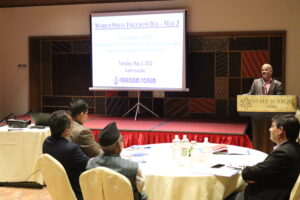
Delivering the inaugural speech General Secretary at Freedom Forum, Dharmendra Jha, expressed worry that government was not committed to ensure free press in Nepal. He questioned whether rapid development of media causes loss of its credibility. So, this is the time to save journalism by preventing technology’s misuse, he underscored. Today, around 60% news come from the social media, thereby questioning news credibility. Wider stakeholder discussion is important to discuss how we use social media or understand the value of factual information. Time has come to think about innovative way of operating media, according to him.
Following Jha’s statement, Executive Dahal reminded that the United Nations had recognized May 3 as the World Press Freedom Day. “After many years of recognition, press freedom still faces several challenges – lately, it is caused by digital transformation. But the government has not been proactive and committed to protect free press,” he argued.
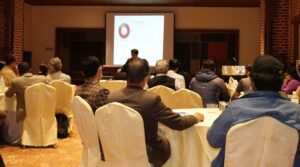
During the event, Mr Narayan Ghimire presented the data on press freedom violations and media trend during the past one year. He said that less number of female journalists faced violation during the past year as compared to male journalists. Indicating a decade’s data, Ghimire stated that though the number of violation showed decreasing trend this year, hostility to press freedom was continuous in Nepal. The new trend was that more number of online media journalists were being targeted, he mentioned. According to the Freedom Forum’s annual May 3 report 2022, total 55 violations occurred in Nepal where 96 journalists were affected.
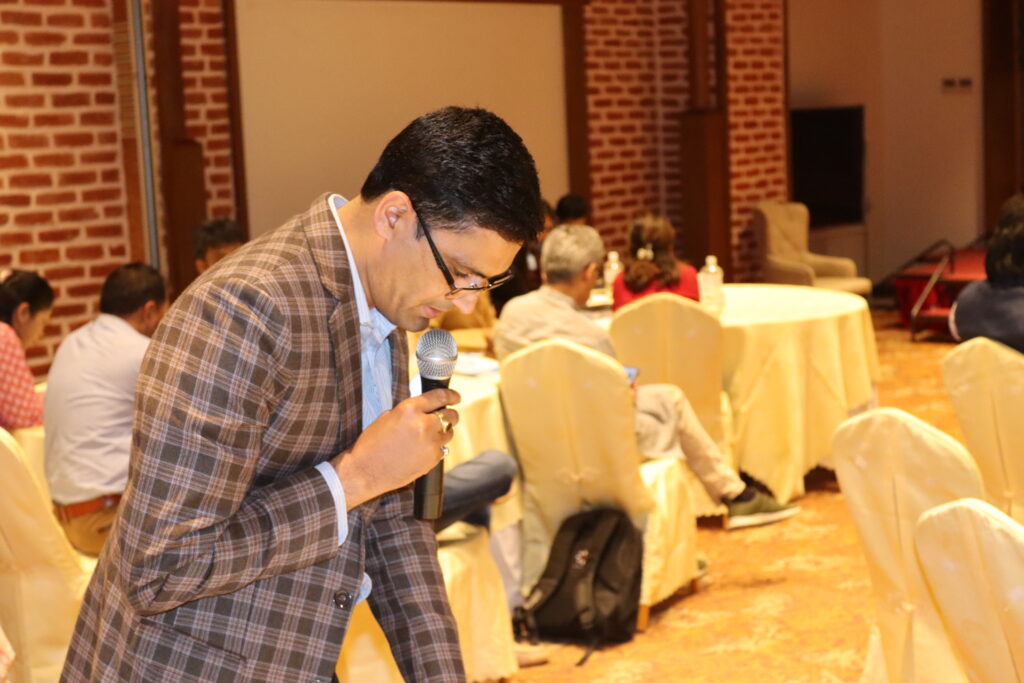
Similarly, Research Associate at FF, Suraj Ray, presented the findings of a study report on court verdicts on 100 cybercrime cases in Nepal. He highlighted the findings as- ambiguous court decisions, victims did not getting proper compensation, cyber-enabled crimes prosecuted under ETA, women target of cybercrime etc.
Executive Chief Dahal presented on the FF’s review on the problematic provisions of Information Technology Bill through from human rights perspective.
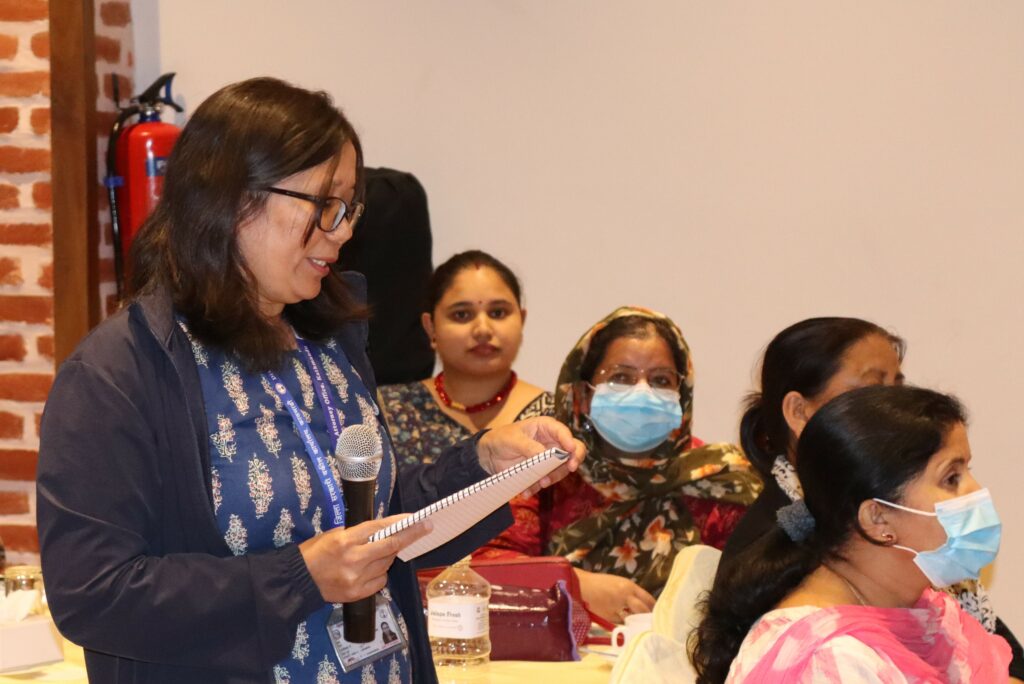
Advocate Rishi Ram Ghimire suggested that analysis of Supreme Court verdicts could add more value to the report. There are various underlying problems in the investigation of cybercrime cases like problems of understanding among lawyers and police persons, use of ETA in irrelevant cases and process of investigation by the police and prosecuting authority. While analyzing cybercrime-related cases, both private and public digital spaces should be observed carefully, he suggested. Most importantly, lawyers at Kathmandu District Court should also be trained on provisions of ETA and freedom of expression.
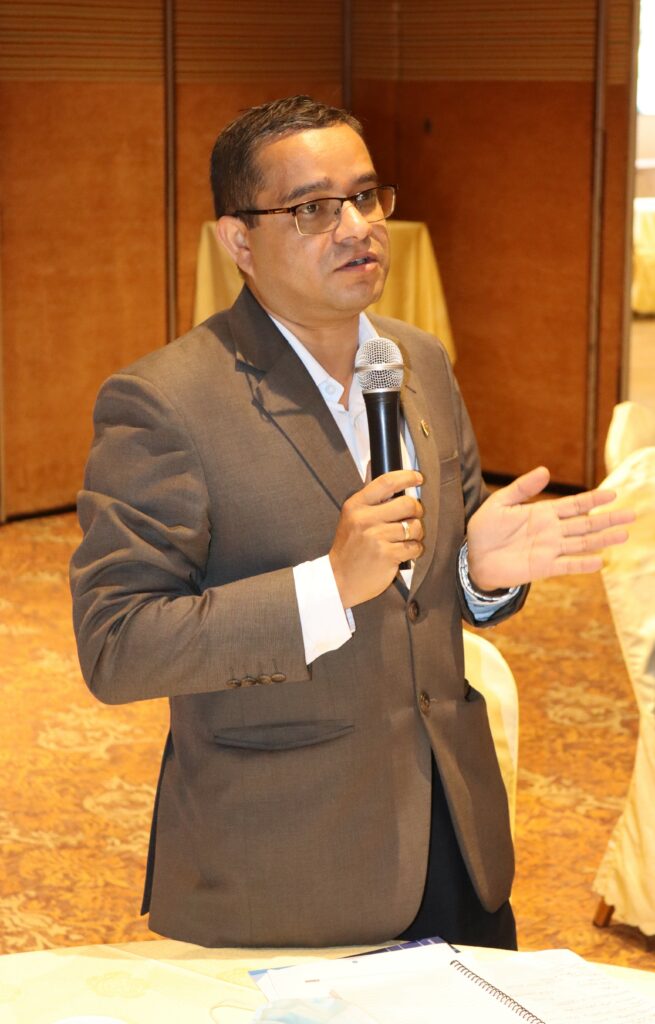
Adding to advocate Ghimire, Assistant District Attorney in Kathmandu, Siluka Lingthep, said that in some cases of high-level public officials like President, Prime Minister, they do not demand compensation in the legal case on character assassination on digital space. She however admitted that majority of the cases could be prosecuted under defamation, criminal law but victims themselves follow this route. Hence, Kathmandu District Attorney is forced to initiate prosecution. Also, there are three laws related to defamation which may lead to misuse of laws, she said. She also observed that the policy analyses was an important knowledge resource on pressing issue of the day.
“In case of media, most of the cases under ETA are related to contents published on the media. We are only prosecutors, laws are formulated by the parliamentarians. So, lawmaking process should also be responsible,” she reminded.
Moreover, advocate Santosh Sigdel pointed that digital threat is increasing with increasing digitization but there is no adequate public discourse in it. There are many problematic provisions in the IT Bill and ETA that challenge digital safety and privacy of the citizens. “The government is moving towards mass surveillance of the citizens in the name of cyber security. Therefore, civil society actors should be aware and speed up advocacy activities,” he argued.
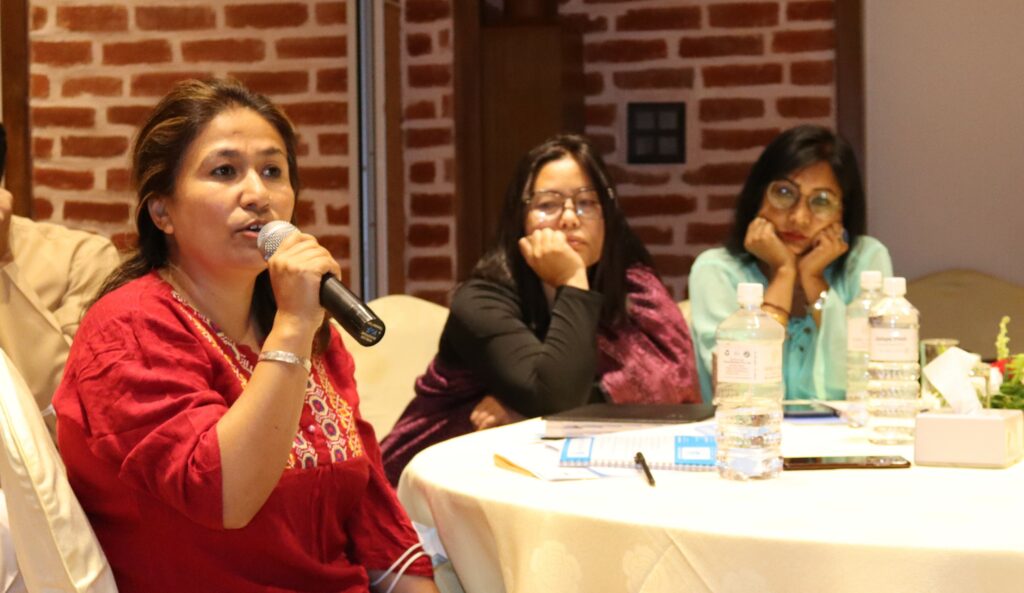
Deputy Superintendant of Police Er. Dipesh Joshi from Nepal Police Cyber Bureau said that most of the cybercrime-related cases with poor investigation are from Metropolitan Crime Division, Teku and it was before establishment of Cyber Bureau. “In most cases, victims themselves choose to file case under ETA even if the case is related to defamation because prosecution time is shorter for ETA related cases and safety of victims is our priority,” he viewed.
Seconding the statement of DSP Joshi, advocate Pabitra Raut shared her own analysis at twitter and said that victims want quick relief and revenge, hence, they choose ETA as a tool to punish oppressor. Also, in the cases related to media, the victims need to file complaint at Press Council Nepal but they directly approach police office, which is worrying. She also suggested that while analyzing right to free expression on the internet, differentiating public and private domain is must, she stressed.
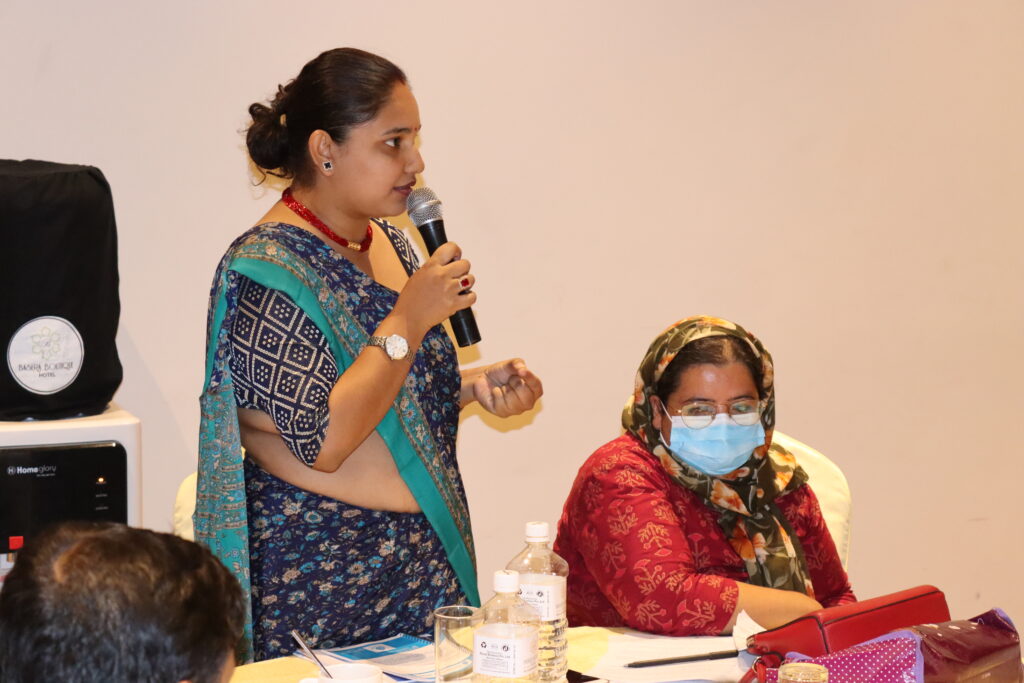
Journalist Pabitra Guragain claimed that one should have zero tolerance towards online violence and its effect on the victim. It also affects victim’s mental health and affects freedom of opinion.
Media educator Trishna Acharya lamented about twenty years long impunity case of her father journalist D. Kaudinya’s murder but her family has not been ensured justice. She also shared her recent research that more children were being addicted to online space these days which lead to psychological and emotional instability. Hence, we, civil society should also educate this new generation on economic, legal and media literacy and include these contents in school curricula, she urged.
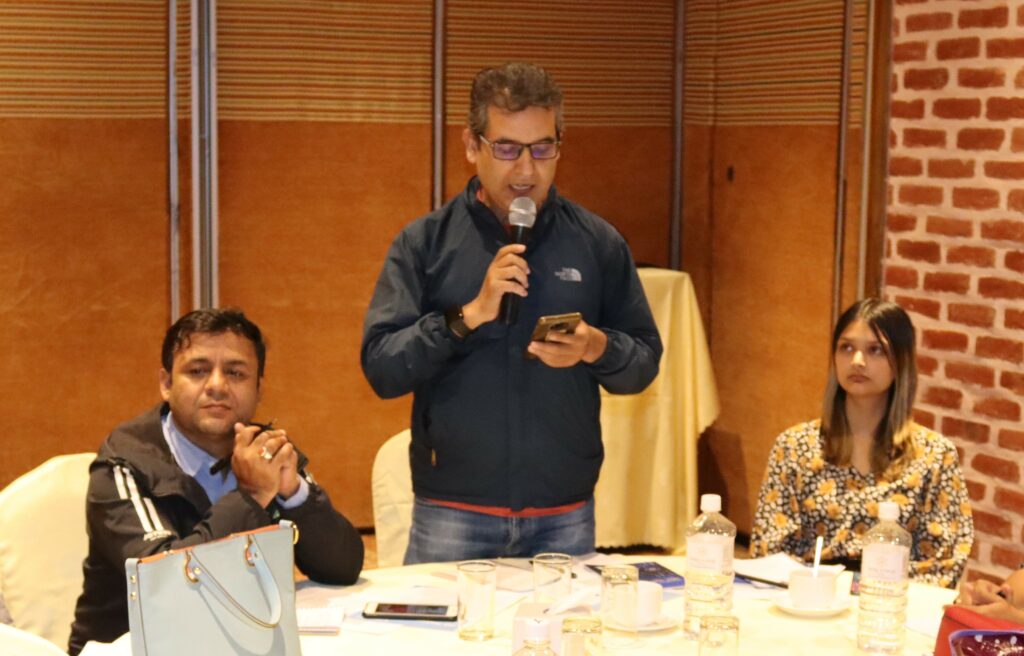
Reminding the government’s repeated moves against press freedom and freedom of expression, journalist Jeevan Bhandari said that in addition to this, internet service providers have warned that internet service in the country might be disrupted soon which would obviously affect journalists’ working online. We need to advocate for free internet in the country as it has become basic need these days.
Editor at www.technologykhabar.com Anuj Raj Dhungel informed that the draft of national cyber security strategy is being prepared which has provisions restricting citizens’ exercise of freedom of expression. “Our major concern is that technology worldwide has developed far beyond our backdated laws and we should start discussing on the content filtering technology Nepal telecommunication Authority is preparing to bring from Israel”, he said, “Moreover, ETA was designed to regulate economic transactions online but its misuse is rampant these days.”
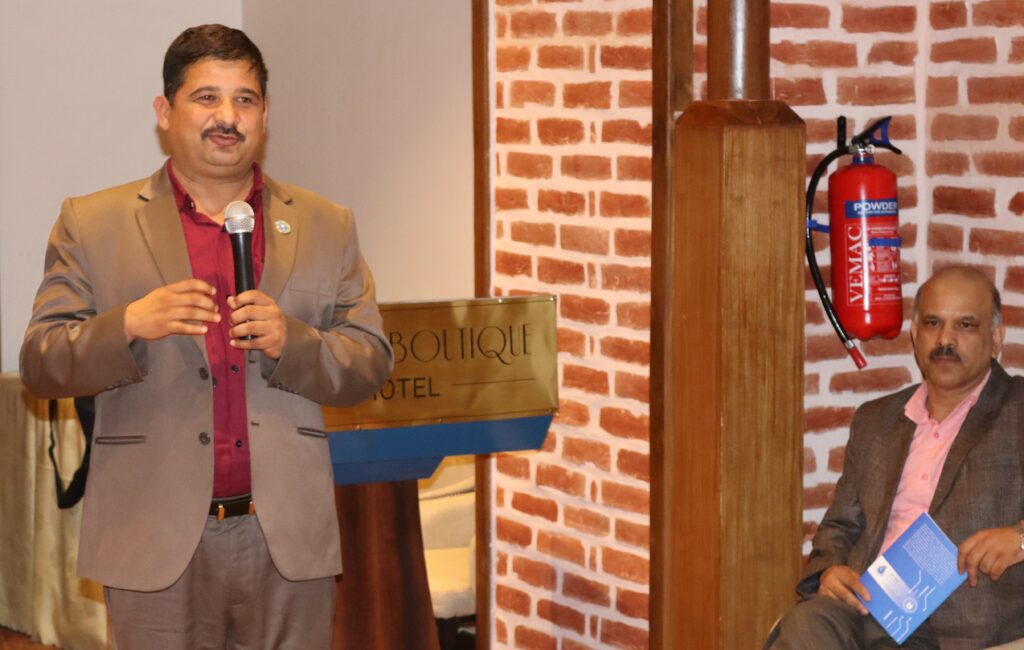
Kamala Bishwokarma from Jagaran Media Center stressed on the need to monitor hate speech and defamation against minorities and indigenous groups in social media.
Deepak Acharya claimed that the major problem these days is free expression and free press are observed through same lens; it is time to think twice whether journalists are crossing boundary of fair journalism in the name of practicing free expression.
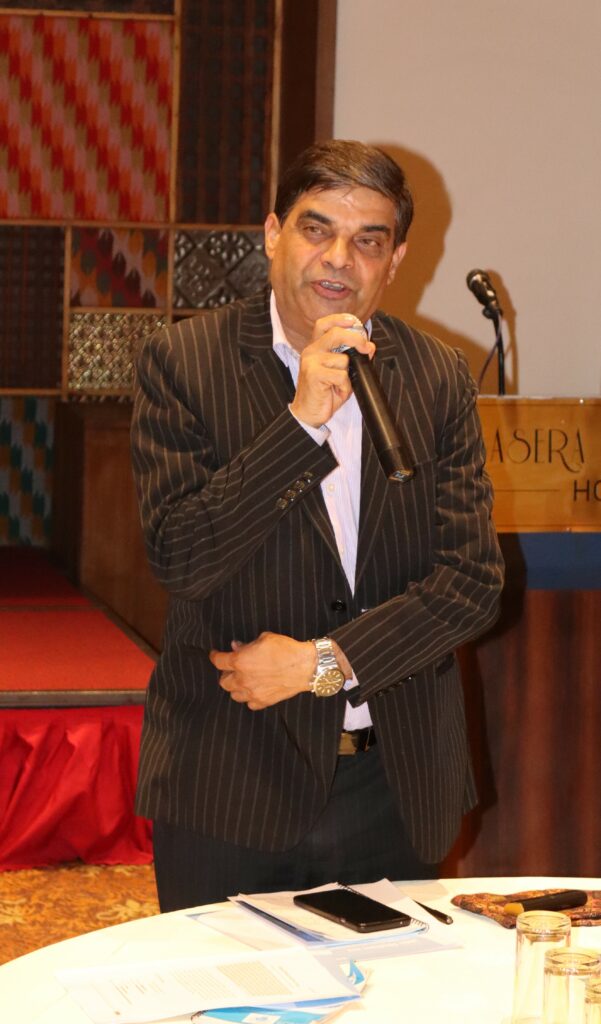
President of the Federation of Nepali Journalists, Bipul Pokhrel praised the policy analysis paper as an important knowledge resource for lawmakers, rights defenders, civil societies, media and invited the rights activists to be always ready for the activism to defend press freedom and free expression in the country and pressurize the government for appropriate laws respecting citizen’s rights. He warned the state authority not to draft any laws shrinking press freedom and free speech.
He also invited Nepal Bar Association’s newly elected Chair Gopal Krishna Ghimire to collaborate with FNJ in its activism for journalists’ rights.
Newly elected Chairperson of Nepal Bar Association Gopal Krishna Ghimire said that he was enlightened by the presentations and discussions in the program. “As a freedom advocate I am always in support of democracy and rule of law,” he said, admitting that legal sector also has weaknesses and need improvement. Internet being a basic human right these days, should be regulated and used for good but not controlled. In case of litigation process, the investigating body should be judicious and responsible, he added. The concern shown on problematic IT Bill by Freedom Forum would help prod lawmakers to amend it, he viewed.
Lastly, newly elected Chairperson at Sancharika Samuha (forum of women journalists) Bimala Tumkhewa extended her wish on World Press Freedom Day 2022 to all the participants and concluded the event, saying that free press must not be compromised. Human rights must be protected and protected in cyber spaces, she underscored, adding that the policy analyses paper FF prepared on IT Bill was solid document/tool for advocacy of FoE online.
The event witnessed presence of 48 participants, including 15 women.

